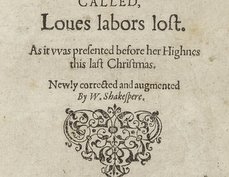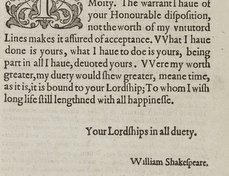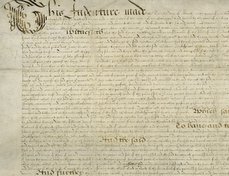Terms of use
The Huntington Library has graciously contributed the above images from their collections. Visitors may link to or download these images for personal research or non-commercial publication. As a matter of good scholarly practice and for the benefit of future researchers, we ask that researchers using reproductions of our materials give appropriate credit when quoting from or reproducing an item in the Huntington collections. Images should be captioned with information about the original source, and quotations should be footnoted. For more information about The Huntington's reproduction policy and citation guidelines, please visit their webpages.
Copy-specific information
Title: A most pleasant comedie of Mucedorus the Kings sonne of Valentia, and Amadine the Kinges daughter of Aragon. With the merry conceites of Mouse. Amplified with new additions, as it was acted before the Kings Maiestie at White-hall on Shroue-sunday night. By his Highnes Seruantes vsually playing at the Globe. Very delectable, and full of coneeited [sic] mirth
Date: Imprinted at London : [By William White] for William Iones, dwelling neare Holborne Conduite at the signe of the Gunne, 1610
Repository: The Huntington Library, San Marino, CA, USA
Call number and opening: 62676, title page
View online bibliographic record
This is the third quarto of Mucedorus, the most frequently reprinted play of the early modern period, reaching seventeen known editions between 1598 and 1668. The play was first attributed to Shakespeare in a bound volume of quartos in the library of Charles I (ca. 1631/2) that included six other plays with doubtful associations with Shakespeare (Kirwan 2011), though this volume has since been broken up and the binding with the attribution destroyed. Few attempts have been made to ascertain the play’s authorship beyond rejecting the case for Shakespeare (Sharpe 710-16), though MacDonald P. Jackson and Hugh Craig have made the case that the 1610 revisions – including a scene that evokes Twelfth Night – may be by the company’s resident dramatist, an argument discussed by Will Sharpe in the most recent edition of the disputed plays (Sharpe 2013, 716).
As well as being frequently republished, Mucedorus also appears to have continued being performed; the 1606 quarto updates the epilogue to refer to a male monarch, and the 1610 edition introduces “new additions” ostensibly for a court performance. The date of the revival by the King’s Men raises the possibility that the play was revived in order to take advantage of the availability of bears for performance, especially as bears also feature in the company’s contemporaneous The Winter’s Tale and Oberon, The Fairy Prince (see Kirwan 2013). The play anticipates Shakespeare’s most famous stage direction with its “Enter Seg[asto], and Amadine after him, being pursued with a Beare” (B1r).
The play has historically been dismissed by critics as light or inconsequential, prompted partly by records of the play’s provincial performance and its genre status as an early romance filled with bears, cannibals, forests and disguised princes. Yet the allusions to court performance and the care taken in the play’s multiple revisions suggest this was an important copy for the company, and this is reflected in the elaborate presentation of the third quarto with its border designs on the title page and around the prefatory materials. The quarto also includes a rare doubling chart suggesting that ten actors can play all the roles (extended from eight in the 1598 quarto to account for characters in the new scenes), which may imply that the play was offered out for other groups to perform (see Preiss 2007).
The copy shown above, which is part of the Huntington Library collection, is one of three editions listed in the English Short Title Catalogue.
Written by Peter Kirwan
Sources
Peter Kirwan, "The First Collected 'Shakespeare Apocrypha'", Shakespeare Quarterly 62.4 (2011): 594-601.
Peter Kirwan, "Mucedorus" in The Elizabethan Top Ten, eds Andy Kesson and Emma Smith (Farnham: Ashgate, 2013): 223-34.
Richard Preiss, "A Play Finally Anonymous" in The Shakespeare Apocrypha, ed. Douglas A. Brooks (Lampeter: Edwin Mellen, 2007).
Will Sharpe, "Authorship and Attribution" in William Shakespeare and Others: Collaborative Plays, eds Jonathan Bate and Eric Rasmussen, with Jan Sewell and Will Sharpe (Basingstoke: Palgrave Macmillan, 2013): 643-747.
Last updated March 20, 2018










